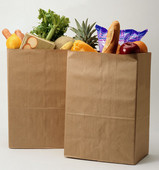- Cancer Takes Tough Toll on Family Finances
- You Might Fare Better If Your Doctor Is Female, Study Finds
- CDC Launches Online ‘Heat Forecaster’ Tool as Another Summer Looms
- Biden Administration Sets Nursing Home Staffing Minimums
- Neosporin Ointment in the Nose Might Be Potent Antibiotic
- Physical Ills Often Plague People With Schizophrenia, Bipolar
- Taking Psilocybin for Depression? Relationship With Therapist Is Key
- Stick to Heimlich Maneuver Not ‘Anti-Choking’ Devices, FDA Says
- Women in the Military at Risk for Low-Weight Babies
- Repeat Blasts Can Damage Soldiers’ Brains, Study Confirms
Store Foods Safely to Prevent Illness


THURSDAY, Oct. 10
Proper food storage is essential to prevent foodborne illnesses, the U.S. Food and Drug Administration says.
Keeping foods chilled at proper temperatures is one of the best ways to prevent or slow the growth of bacteria that can make you and others sick, the agency said in a consumer update.
Refrigerate or freeze perishable foods as soon as possible. Never allow meat, poultry, seafood, eggs, produce or other foods that require refrigeration to sit at room temperature for more than two hours. The limit is one hour if the temperature is above 90 degrees F. This also includes leftovers, take-out foods and “doggie bags.”
When putting food away, don’t crowd the refrigerator or freezer so tightly that air can’t circulate. Keep your appliances at the proper temperatures — at or below 40 degrees F for the refrigerator and 0 degrees F for the freezer.
Check storage directions of food labels. Many items other than meats, vegetables and dairy products need to be kept cold. If something wasn’t properly refrigerated, it’s usually best to throw it out, the FDA said.
Consume ready-to-eat foods such as lunch meats as soon as possible. The longer they’re stored in the refrigerator, the greater the risk that harmful bacteria can grow.
Be alert for spoiled food and throw out anything that looks or smells suspicious.
If you lose electricity, keep refrigerator and freezer doors closed as much as possible. Your refrigerator will keep food cold for about four hours if it’s unopened. A full freezer will keep a safe temperature for about 48 hours if the door is not opened.
Checked canned goods for damage, which is evident by swelling, leakage, punctures, holes, fractures, extensive deep rusting, or crushing or denting severe enough to prevent normal stacking or opening with a manual, wheel-type opener. Newly bought cans with damage should be returned to the store for a refund or exchange and older ones should be thrown away.
Don’t store foods, such as potatoes or onions, under the sink. Leakage from the pipes can damage the food. Store potatoes and onions in a cool, dry place. Never store food near household cleaning products and chemicals.
More information
The U.S. Department of Agriculture has more about food safety.
Source: HealthDay
Copyright © 2024 HealthDay. All rights reserved.










